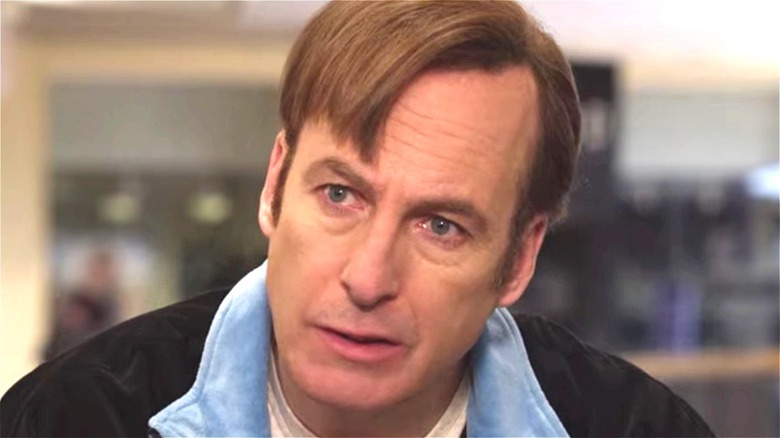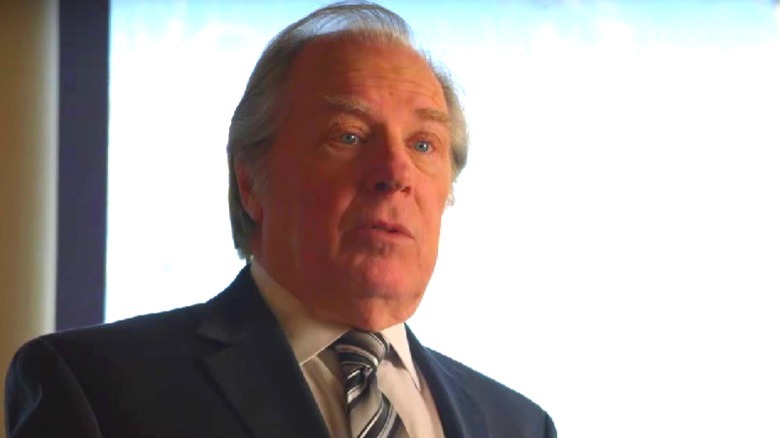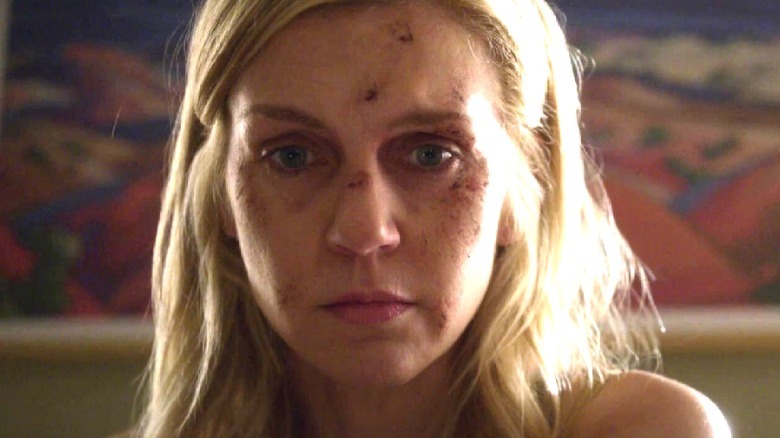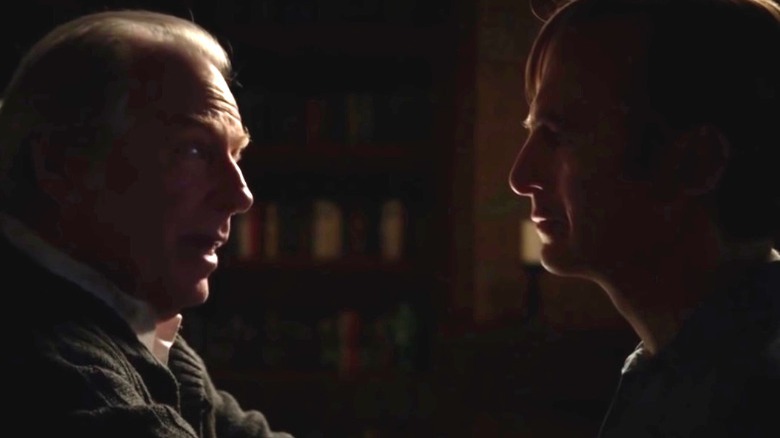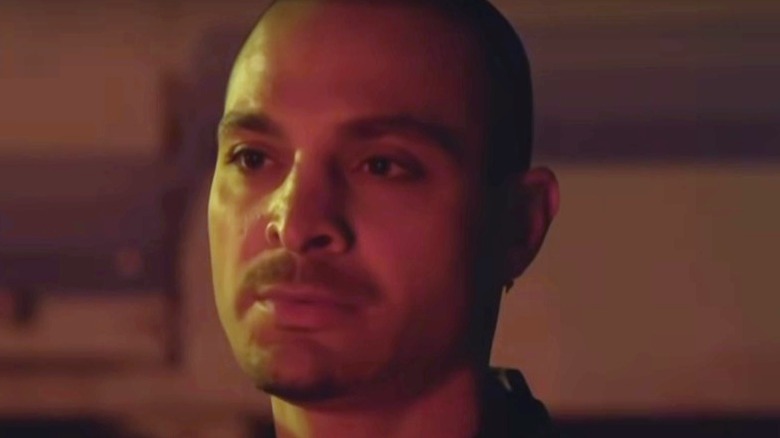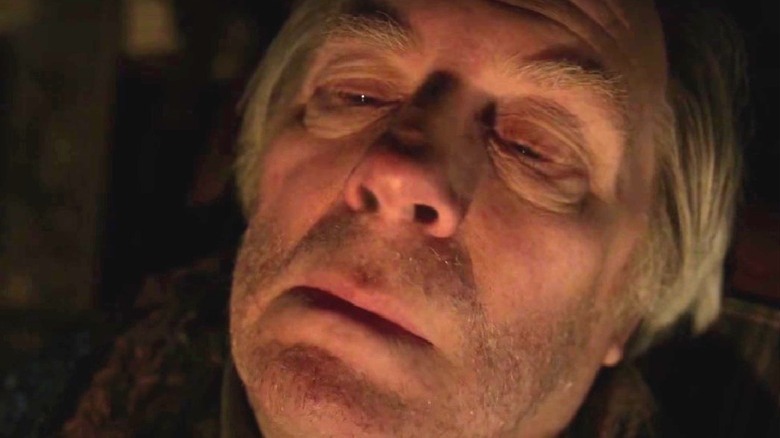The Ending Of Better Call Saul Season 3 Explained
The third season finale of "Better Call Saul" starts with a sweet memory of shared fraternity and ends with a bitter rejection of the living world. The mythology of the McGill brothers is one of Cain and Abel-like conflict over their mother's approval which ultimately spills over into their adult careers as dueling lawyers. The elder brother is rules-bound and a partner in a longstanding law firm, the younger is an upstart whose prior behavior makes him a hard sell for a legitimate legal career. Incompatible, they ultimately go to war, despite any buried love they share for one another. Their shared story arc ends appropriately, with bitter recrimination and a metaphorical boulder to the back of the head.
That strike shatters their relationship permanently. Yet Chuck (Michael McKean) is the one who ultimately falls victim to his own inability to forgive, reach out and accept help. "Lantern" is a tragic story about a tragic relationship, but it also provides Jimmy McGill (Bob Odenkirk) with yet another stepping stone on his path to becoming Saul Goodman — and ultimately Gene Takavic. Let's dig deep into the episode's ending and explain how the show said goodbye to Chuck McGill.
Chuck's downfall means the end of his friendship with Howard
In the wake of the realization that covering Chuck's electromagnetic hypersensitivity will raise HHM's insurance premiums to insurmountable heights — and Chuck's attempt at suing Howard Hamlin (Patrick Fabian) for $8 million, the relevant cost of his stake in the firm – Howard and Chuck's relationship finally reaches a crisis point. Howard has tried to pressure Chuck into retirement instead of fighting the insurance company's edict, and Chuck refuses to surrender.
Howard had been Chuck's greatest ally up through the latter half of Season 3, frequently risking HHM's reputation by helping Chuck stymie Jimmy's law career or offering to back Chuck's latest attempt at getting Jimmy disbarred and jailed. After Chuck's performance on the witness stand during "Chicanery," which exposed his mental health issues to a full courtroom, their friendship went into turmoil.
Still, Howard shares Chuck's ultimate motivation: keeping HHM's nose clean. He can't protect Chuck anymore as he becomes a liability instead of an asset and is aghast that he's injured the firm's future prospects. The best Howard can offer Chuck is the first $3 million of what he owes him, and a dignified exit in front of the rest of his colleagues. Chuck takes the pay-off and walks away, even though it visibly pains him to do so.
For Chuck, this is no victory. He tries to call off the lawsuit and tries to defend his behavior to the board, but his hyper-focus on bringing Jimmy down has ruined everything for him. Watching anger, pride, gratefulness, and sadness shape-shift Michael McKean's features as he descends the staircase at HHM one last time is enough to make one sympathize with Chuck and his difficulty dealing with anything that lacks clear-cut morality.
Kim's priorities shift
Kim Wexler (Rhea Seehorn) is suffering through her own dark night. After having her torn face and broken arm healed at the hospital in the wake of her car wreck in Episode 9, "Fall" (per IMDb), she and Jimmy convene to gather the documents spilled by her accident. She watches him silently, impassively, brooding.
The next morning he watches her struggle with her pain and is laden with guilt, worried that the extra work she's taken on has exhausted and endangered her. But Kim blames herself for driving while tired, a decision that could've impacted more than just her own safety. She makes an abrupt choice to take a day off, pushing all of her other scheduled cases, rent some movies, and relax — finally prioritizing her happiness and her relationship with Jimmy. For Kim, this is a big step. And Jimmy — denied the Sand Piper money — closes the office so that Kim can work from home and they can save cash.
One can feel the problems bubbling beneath the strong core of Jimmy and Kim's relationship — the morality they both harbor tugs on them. They will continue to walk a fine line between good and bad as time goes on.
While further seasons have wed Jimmy and Kim more closely together (literally so, by the fifth season), we know that something will tear them apart by the time Saul meets Walter White (Bryan Cranston) during "Breaking Bad." As strong as the union between them remains, no matter how many sacrifices they make for one another, that crucial split must happen. The Season 3 finale offers few hints as to how that might happen, Kim and Jimmy's mutual loyalty gels, setting up further future plot twists.
Cain and Abel in New Mexico
Jimmy hears about Chuck's forced retirement and visits him at home, only to discover Chuck using electrical appliances without any symptoms of his illness. The brothers do not celebrate this victory but instead, get down to the dirty business of discussing the rift between them. It's one that will yawn permanently open after their final discussion.
While Jimmy expresses regret about what he did to Chuck to get the Mesa Verde case back in Kim's grasp, any regret Chuck feels about trying to get Jimmy disbarred remains unexpressed. He has chosen to address his brother with cold, formal fury, ultimately dealing his brother the ultimate verbal blow by saying Jimmy "never meant all that much to [Chuck]."
It's a line that Chuck's portrayer, Michael McKean, declared to be false during an interview printed in Vulture in 2017. "To say he didn't mean anything to him is absurd," McKean contends. Considering how thoroughly Chuck has ruined his life trying to prove that Jimmy is a conman at heart, that is patently true.
Chuck is absolutely correct about one aspect of his fierce rejection of his brother: Jimmy is driven by his guilt but refuses to learn from it. It's that guilt that leads Jimmy to undo the damage he did in the Sand Piper case, rejecting millions to restore Irene Landry (Jean Effron)'s relationship with her friends. It's guilt that brings him to Chuck's door. But Jimmy never feels enough guilt to stop pushing the limits of the law. It makes his promises ring hollow even when he does good. Whether Chuck is driven by pure jealousy formed by his mother's preference for Jimmy or he feels like the only adult and last sane man in the room, both brothers share responsibility for their choices.
Nacho and Hector's Lives Take Turns
In the middle of all of this McGill drama, Nacho Varga (Michael Mando) and Hector Salamanca (Mark Margolis) decide to use Manuel Varga's (Juan Carlos Cantu) upholstery shop as a front for Hector's drug ring. Nacho pleads with his father to agree to the deal, which will be financially beneficial to the family and will afford the Vargas with protection should things go sour.
And things do go sour almost immediately, as Juan Bolsa (Javier Grajeda) informs Nacho and Hector that he's planning on using Gus Fring (Giancarlo Esposito)'s resources to smuggle drugs across the border instead of using Hector's. That means Hector's cut of the pie will become much smaller. Hector is sent into a rage, accusing Bolsa of taking personal vengeance against him. Bola tries to encourage calm and explains their boss wants them to work together.
Hector's fiery rejection results in him having a stroke before the group, eventually collapsing on the ground. The other dealers scatter except for Gus and Nacho, the former of whom falls to his knees to apply CPR to Hector. For Nacho this seems to be a lucky moment — he was already planning on murdering Hector. But he takes the time to replace the fake nitroglycerine pills he'd swapped out of Hector's bottle with real ones.
Here more than anywhere else in "Lantern" is "Better Call Saul"'s future — and "Breaking Bad"'s plotline — set in stone. We know that Hector's stroke will leave him mute and in a wheelchair, and that Gus will become quite a figurehead with time. But Nacho knows none of this, and only wants to get Hector off of his back by any means necessary.
Chuck chooses suicide
In the end, Chuck suffers a relapse of his electromagnetic hypersensitivity. After days alone destroying his home to figure out what's making his electric meter run, he's still in pain and without a single answer. Every appliance he has is sitting on the lawn, he's ripped out the wiring and shut the electricity off, but still, he suffers. Chuck sits alone and dead-eyed in his living room. The only light in the room streams out from a very symbolic lantern, which he is slowly kicking toward the edge of his coffee table.
At the beginning of the episode, we watch a brief vignette in which a young Chuck and Jimmy, huddled in a pup tent, read a copy of "The Adventures of Mabel" by Harry Thurston Peck by lantern light. The Wrap has pointed out what a symbolic literary choice this is for Jimmy, and it's the book Jimmy talked about back in the season premiere, "Mabel." Like Mabel, lost in the woods, there's no place for Chuck to go.
If Chuck has upset the warmth and light his relationship with Jimmy once produced as a result of his jealousy, insecurity, and a love of the law that surpasses everything else in his life, then Jimmy has — with his inability to adhere to rules and order — burned through the trust Chuck had in him. The only thing left for Chuck is self-immolation, a painful way to go and nearly a martyr's death. For a character that considers himself the only moral person in his life, it's also quite a fitting way to die.
"Better Call Saul" was once defined by the show's brotherly rivalry. Henceforth, Jimmy will go it alone.
If you or anyone you know is having suicidal thoughts, please call the National Suicide Prevention Lifeline at 1-800-273-TALK (8255).
